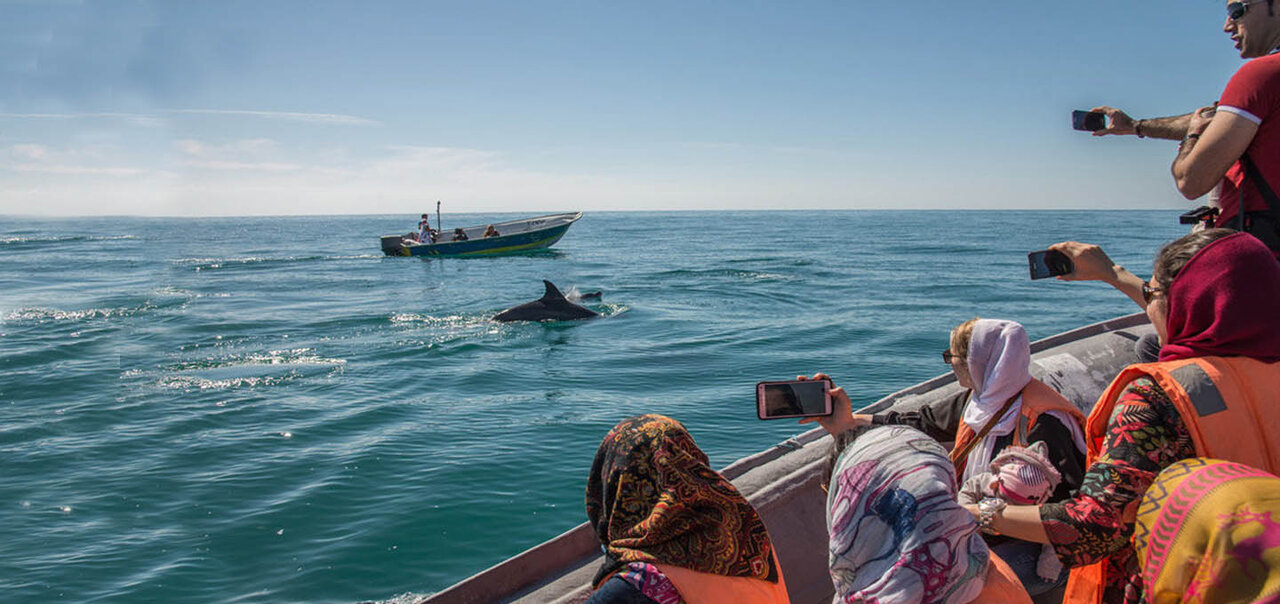Bay of Dolphins: a marine paradise of the Persian Gulf

TEHRAN - The Bay of Dolphins is an exceptional natural attraction situated between the islands of Qeshm and Hengam in southern Iran.
This enchanting marine haven is part of the Persian Gulf’s ecologically rich and diverse region, offering visitors an opportunity to witness fascinating marine life, from playful dolphins to sea turtles and colorful fish.
The bay’s vibrant biodiversity and scenic beauty, combined with cultural experiences on the nearby islands, make it a must-visit destination for nature lovers and adventure seekers alike.
Natural wonders of Qeshm Island
Qeshm, the largest island in the Persian Gulf, is renowned for its rich traditions, cultural heritage, and ecological diversity. Travelers flock to Qeshm for different reasons: some seek to experience southern Iranian culture, admiring the islanders' veiled garments and the rhythmic music played in the harbors. Others come for the gastronomic experience, savoring spicy seafood prepared with age-old recipes passed down through generations. But Qeshm’s true magic lies in its pristine environment. It is a place where coral beaches, mangrove forests, and native wildlife coexist in harmony.
The Bay of Dolphins is one of Qeshm’s crown jewels. This unique bay has evolved into a safe refuge for marine animals. Dolphins, the stars of the bay, are so abundant here that they have lent their name to the area.
Early in the morning, when the sea is calm, visitors have the best chance of spotting these delightful creatures swimming in groups, leaping through the waves, or playfully approaching boats.
A safe haven for marine life
The bay's location between Qeshm and Hengam provides a naturally enclosed and protected environment, perfect for diverse marine species. In addition to dolphins, several types of sea turtles—such as red, green, and leatherback turtles—find sanctuary in these waters.
Moreover, the coral reefs around the islands offer habitats for a vast array of ornamental fish, mollusks, and other marine invertebrates, forming the foundation of a complex ecosystem. This biodiversity attracts not only marine animals but also migratory birds, enhancing the area’s ecological importance.
Sources say that the coral reefs in the waters around Qeshm and Hengam islands play a crucial role in sustaining this vibrant ecosystem. As essential places for aquatic species, these reefs foster biodiversity by supporting marine mammals and fish at all stages of the food chain. With invertebrates at the base of this chain, the ecosystem becomes a rich environment for larger species, ensuring that Qeshm and Hengam remain thriving habitats for aquatic life.
Experiencing the Bay of Dolphins
Visitors can reach Qeshm by plane, or for those traveling domestically, it is common to journey to Bandar Abbas by bus or train and continue to the island by boat. For those seeking flexibility, private cars can also be ferried across the sea to Qeshm. The bay is accessible via guided tours offered by hotels and local accommodations, which arrange boating excursions specifically designed for dolphin-watching.
Once on the island, tourists can choose from a wide range of accommodations, from hotels to eco-lodges in local villages. Water sports and diving opportunities abound along the beaches leading to the Bay of Dolphins, where boats are available for sightseeing trips.
A unique intersection of nature and culture
The Bay of Dolphins reflects not only the natural beauty of southern Iran but also the interconnection between Qeshm’s ecological richness and cultural heritage. Hengam Island, located just a short distance away, complements the bay’s marine attractions with its own unique charm. Together, these two islands form a harmonious environment where travelers can enjoy the best of both worlds: breathtaking wildlife and immersive cultural experiences.
Beyond dolphin-watching, visitors are encouraged to explore Qeshm’s other natural wonders, including its mangrove forests, mud tidal zones, and rocky shores, all of which support diverse flora and fauna. The combination of coral reefs, sandy beaches, and marine invertebrates offers countless opportunities for eco-tourism enthusiasts to explore the natural beauty of this region.
A year-round destination with optimal seasons
Though Qeshm Island welcomes visitors throughout the year, the best time to visit is during the cooler months from mid-autumn to spring. During this period, temperatures are more comfortable, and the air is less humid, making it ideal for outdoor activities and dolphin-watching tours. In the summer months, the heat and humidity can be intense, which might limit outdoor excursions.
AM
Leave a Comment